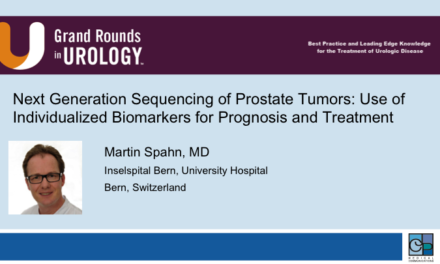Alan W. Partin, MD, Johns Hopkins Medical Institutions, Baltimore, Maryland, discusses which non-genomic biomarkers are the most useful for stratifying patients.
Interview produced by Prostatepedia
Keywords: non-genomic biomarkers, Prostate Health Index, ConfirmMDx, SelectMDx, 4K Score, prostate cancer
ABOUT THE AUTHOR
Dr. Partin is the Jakurski Family Director and Professor of Urology at Johns Hopkins in Baltimore, Maryland. He is the author or co-author of more than 500 scientific articles, serves on numerous editorial boards, and is Editor-in-Chief of Urology Case Reports and editor of the Campbell-Walsh urology text. He has been honored with many awards, including the Hopkins Young Investigators Award, the Pfizer Scholars in Urology Award in 1996, and the “Gold-Cystoscope” award in 2001. In 2004, Dr. Partin was named Director of the Department of Urology at the James Buchanan Brady Urological Institute and Urologist-in-Chief of Johns Hopkins Hospital.
Dr. Partin is an expert in assessing prognosis and making predictions for men with prostate cancer. The creation of The Partin Tables, which can predict with 95 percent accuracy a man’s likelihood of being cured by treatment, made his research famous. Dr. Partin’s laboratories focus on developing and testing new and existing methods for predicting the aggressiveness of prostate cancers so that rational treatment decisions can be made by both patients and physicians.
Dr. Partin’s laboratories have investigated many new “PSA-like” serum tests, some of which are soon to become available for the diagnosis of prostate cancer as well as basic science investigation of new proteins—which may help in detection—and staging of prostate cancer. In addition, Dr. Partin has an academic and clinical interest in the treatment of benign prostatic hyperplasia with an emphasis on minimally invasive techniques.
Dr. Partin received his undergraduate degree in Chemistry from the University of Mississippi, where he was an Academic All-American football player. He received his medical degree and his PhD in Pharmacology and Molecular Sciences from Johns Hopkins University, where he continued his postdoctoral training.




